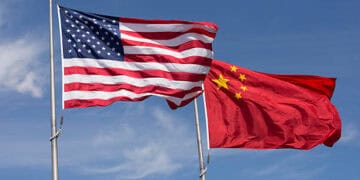A House committee focused on China has issued recommendations aimed at reshaping the United States’ approach to Chinese-made goods, potentially leading to higher tariffs. While the report doesn’t explicitly call for the repeal of China’s preferential trade status, it suggests placing China in a new trading category, which some view as a de facto repeal. The committee envisions a process where Congress regularly assesses which economic sectors should face higher or lower tariffs. This proposal has received bipartisan support, indicating Congress’s growing willingness to build on the trade policies enacted during the previous administration.
However, such actions may risk retaliation from China, affecting various sectors, including farmers, ranchers, and U.S. exporters. The committee arrived at these recommendations after months of deliberation and hearings, with hopes that many of the 150 report recommendations, particularly those related to trade, could be transformed into legislation before the upcoming elections. Representative Raja Krishnamoorthi, a Democrat on the committee, emphasized the need to protect domestic businesses from unfair competition. Congress granted China preferential trade treatment about two decades ago, resulting in lower tariffs and fewer trade barriers.
The committee’s recommendations propose phasing out this preferential treatment over a short period to allow the U.S. economy to adapt. Higher tariffs can increase the cost of imported goods, impacting consumers. The committee suggests using the revenue from increased tariffs to create new market opportunities for U.S. producers and enhance national security. Committee Chairman Mike Gallagher, a Republican, acknowledges that this strategy involves trade-offs but argues that the status quo is no longer effective. In case of Chinese retaliation, the committee advises Congress to consider additional spending to mitigate the harm to farmers, ranchers, and U.S. workers. While lawmakers agree on the need to address China’s economic practices, there are concerns about potential disruptions to the intertwined U.S.-China trade relationship. Any legislative actions proposed by the committee will need to weigh these potential costs.
Additionally, the committee recommends lowering the threshold for duty-free imports into the U.S., particularly concerning foreign adversaries like China, although the specific threshold remains unspecified. While some support reducing the threshold, arguing that it benefits small U.S. businesses and consumers, others believe it may have implications for government revenue and trade dynamics.
Catch the latest in supply chain news on The Supply Chain Report. Visit ADAMftd.com for free international trade tools.
#ChinaTradePolicy #TariffRecommendations #BipartisanSupport #USChinaRelations #TradeLegislation #DomesticBusinesses #NationalSecurity #CongressionalActions #EconomicImpact #FarmersAndRanchers #TradeDynamics #DutyFreeImports















